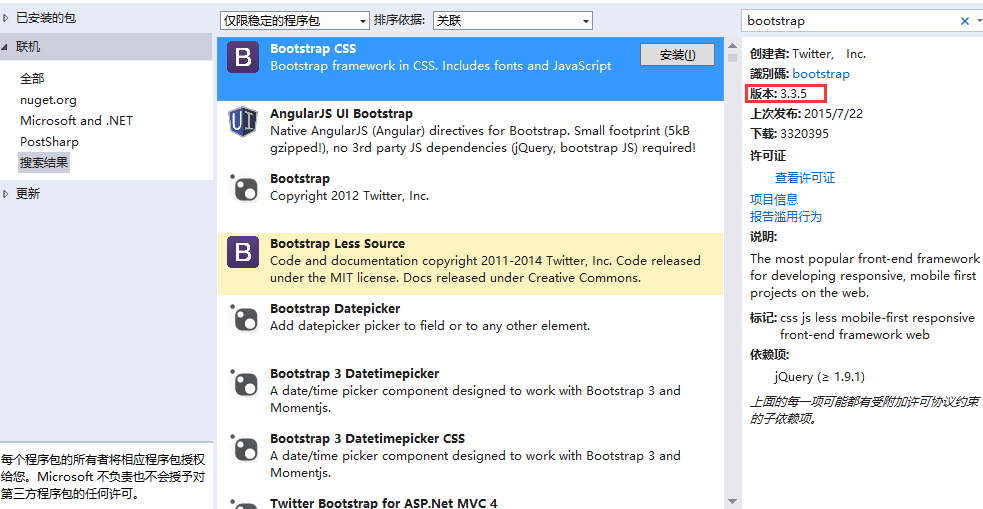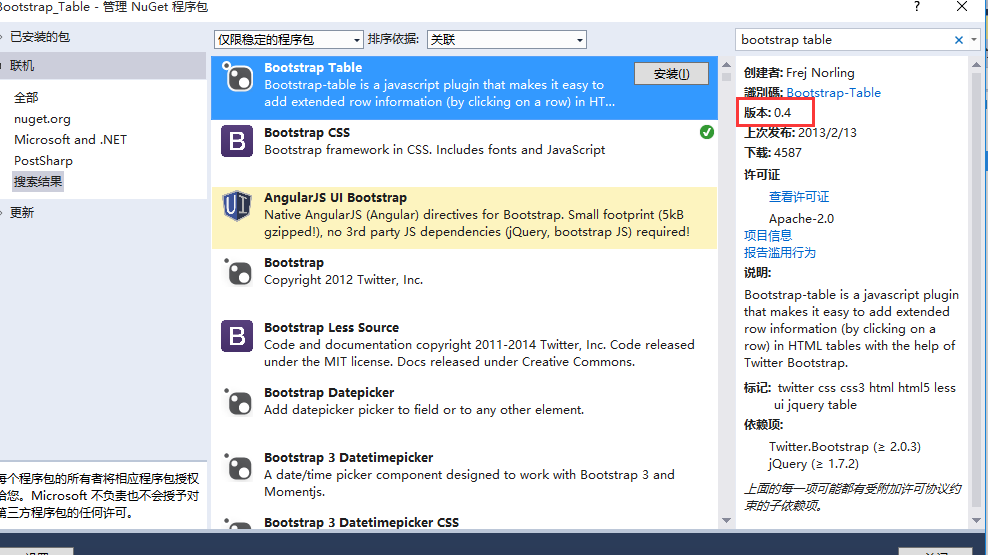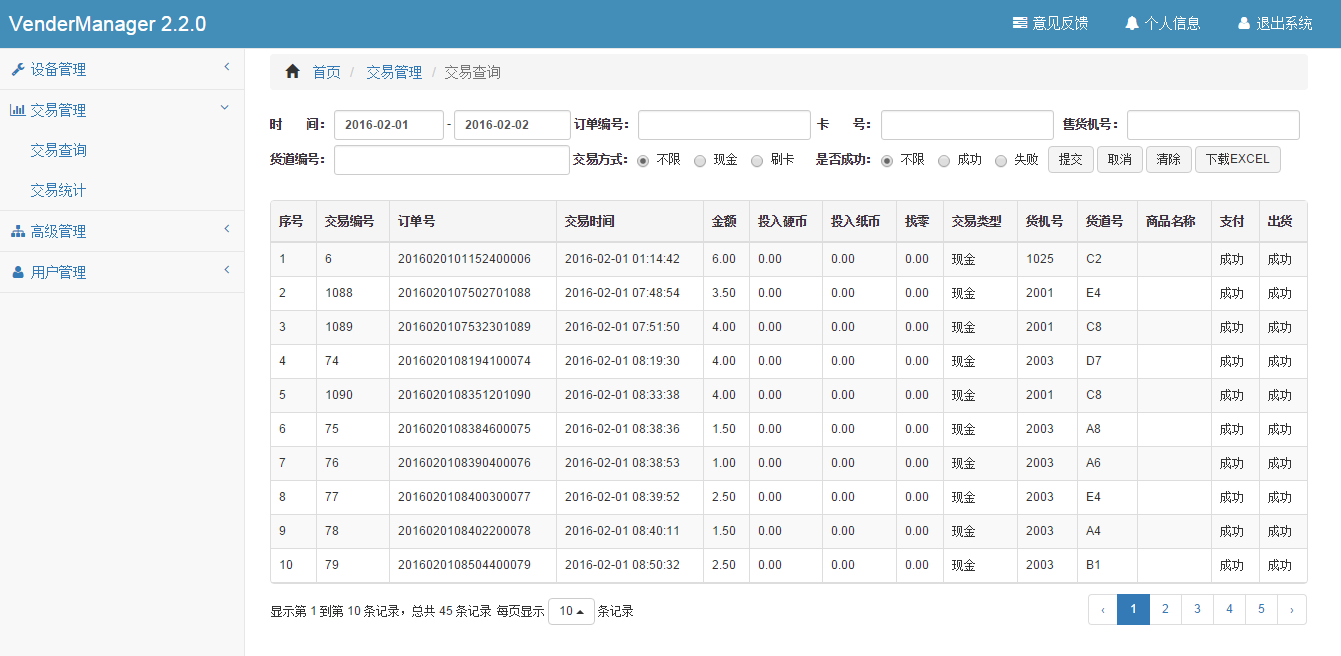 Web Front-end
Web Front-end
 JS Tutorial
JS Tutorial
 Detailed explanation of JS table component artifact bootstrap table (enhanced version)
Detailed explanation of JS table component artifact bootstrap table (enhanced version)
Detailed explanation of JS table component artifact bootstrap table (enhanced version)
1. Introduction of Bootstrap Table
Regarding the introduction of Bootstrap Table, there are generally two methods:
1. Directly download the source code and add it to the project.
Since Bootstrap Table is a component of Bootstrap, it depends on Bootstrap. We first need to add a reference to Bootstrap.
2. Use our magical Nuget
Open Nuget and search for these two packages

Bootstrap is already the latest 3.3.5, we Just install it directly.

The version of Bootstrap Table is actually 0.4, which is too cheating. Therefore, the blogger suggests that the Bootstrap Table package should be downloaded directly from the source code. The latest version of Bootstrap Table seems to be 1.9.0.
Introduction to the background of this article:
Recently, customers have put forward demands and want to optimize the original management system so that it can be displayed well through mobile phones. Two solutions come to mind:
a Plan: Keep the original page and design a new page suitable for mobile phones. When accessed by mobile phone, enter m.zhy.com (mobile page). When accessed by PC device, enter www.zhy.com (pc page). )
b plan: Use bootstrap framework to replace the original page and automatically adapt to mobile phones, tablets, and PC devices
Using plan a, you need to design an interface and rewrite the appropriate page Interface, considering time and cost issues, the project adopted plan b
2. Effect display

2. Brief introduction to BootStrap table
bootStrap table is a lightweight table plug-in that uses AJAX to obtain data in JSON format. Its paging and data filling are very convenient and supports internationalization.
3. How to use
1. Introducing js and css
<!--css样式--> <link href="css/bootstrap/bootstrap.min.css" rel="stylesheet"> <link href="css/bootstrap/bootstrap-table.css" rel="stylesheet"> <!--js--> <script src="js/bootstrap/jquery-1.12.0.min.js" type="text/javascript"></script> <script src="js/bootstrap/bootstrap.min.js"></script> <script src="js/bootstrap/bootstrap-table.js"></script> <script src="js/bootstrap/bootstrap-table-zh-CN.js"></script>
2. Table data filling
bootStrap table has two ways to obtain data. One is to specify the data source through the data-url attribute of the table; the other is Specify the url to obtain the data when initializing the table through JavaScript
<table data-toggle="table"> <thead> ... </thead> </table> ...
$('#table').bootstrapTable({
url: 'data.json'
});The second method is more flexible than the first method when processing complex data. The second method is generally used to fill the table data.
$(function () {
//1.初始化Table
var oTable = new TableInit();
oTable.Init();
//2.初始化Button的点击事件
/* var oButtonInit = new ButtonInit();
oButtonInit.Init(); */
});
var TableInit = function () {
var oTableInit = new Object();
//初始化Table
oTableInit.Init = function () {
$('#tradeList').bootstrapTable({
url: '/VenderManager/TradeList', //请求后台的URL(*)
method: 'post', //请求方式(*)
toolbar: '#toolbar', //工具按钮用哪个容器
striped: true, //是否显示行间隔色
cache: false, //是否使用缓存,默认为true,所以一般情况下需要设置一下这个属性(*)
pagination: true, //是否显示分页(*)
sortable: false, //是否启用排序
sortOrder: "asc", //排序方式
queryParams: oTableInit.queryParams,//传递参数(*)
sidePagination: "server", //分页方式:client客户端分页,server服务端分页(*)
pageNumber:1, //初始化加载第一页,默认第一页
pageSize: 50, //每页的记录行数(*)
pageList: [10, 25, 50, 100], //可供选择的每页的行数(*)
strictSearch: true,
clickToSelect: true, //是否启用点击选中行
height: 460, //行高,如果没有设置height属性,表格自动根据记录条数觉得表格高度
uniqueId: "id", //每一行的唯一标识,一般为主键列
cardView: false, //是否显示详细视图
detailView: false, //是否显示父子表
columns: [{
field: 'id',
title: '序号'
}, {
field: 'liushuiid',
title: '交易编号'
}, {
field: 'orderid',
title: '订单号'
}, {
field: 'receivetime',
title: '交易时间'
}, {
field: 'price',
title: '金额'
}, {
field: 'coin_credit',
title: '投入硬币'
}, {
field: 'bill_credit',
title: '投入纸币'
}, {
field: 'changes',
title: '找零'
}, {
field: 'tradetype',
title: '交易类型'
},{
field: 'goodmachineid',
title: '货机号'
},{
field: 'inneridname',
title: '货道号'
},{
field: 'goodsName',
title: '商品名称'
}, {
field: 'changestatus',
title: '支付'
},{
field: 'sendstatus',
title: '出货'
},]
});
};
//得到查询的参数
oTableInit.queryParams = function (params) {
var temp = { //这里的键的名字和控制器的变量名必须一直,这边改动,控制器也需要改成一样的
limit: params.limit, //页面大小
offset: params.offset, //页码
sdate: $("#stratTime").val(),
edate: $("#endTime").val(),
sellerid: $("#sellerid").val(),
orderid: $("#orderid").val(),
CardNumber: $("#CardNumber").val(),
maxrows: params.limit,
pageindex:params.pageNumber,
portid: $("#portid").val(),
CardNumber: $("#CardNumber").val(),
tradetype:$('input:radio[name="tradetype"]:checked').val(),
success:$('input:radio[name="success"]:checked').val(),
};
return temp;
};
return oTableInit;
};The field field must correspond to the field returned by the server to display the data.
3. Obtaining data from the background
a. Obtaining data from servlet
BufferedReader bufr = new BufferedReader(
new InputStreamReader(request.getInputStream(),"UTF-8"));
StringBuilder sBuilder = new StringBuilder("");
String temp = "";
while((temp = bufr.readLine()) != null){
sBuilder.append(temp);
}
bufr.close();
String json = sBuilder.toString();
JSONObject json1 = JSONObject.fromObject(json);
String sdate= json1.getString("sdate");//通过此方法获取前端数据
...b. Obtaining data through the corresponding method in springMvc Controller
public JsonResult GetDepartment(int limit, int offset, string orderId, string SellerId,PortId,CardNumber,Success,maxrows,tradetype)
{
...
}4. Paging ( The most encountered problems)
When using paging, the data returned by the server must include rows and total. The code is as follows:
...<br>gblst = SqlADO.getTradeList(sql,pageindex,maxrows);
JSONArray jsonData=new JSONArray();
JSONObject jo=null;
for (int i=0,len=gblst.size();i<len;i++)
{
TradeBean tb = gblst.get(i);
if(tb==null)
{
continue;
}
jo=new JSONObject();
jo.put("id", i+1);
jo.put("liushuiid", tb.getLiushuiid());
jo.put("price", String.format("%1.2f",tb.getPrice()/100.0));
jo.put("mobilephone", tb.getMobilephone());
jo.put("receivetime", ToolBox.getYMDHMS(tb.getReceivetime()));
jo.put("tradetype", clsConst.TRADE_TYPE_DES[tb.getTradetype()]);
jo.put("changestatus", (tb.getChangestatus()!=0)?"成功":"失败");
jo.put("sendstatus", (tb.getSendstatus()!=0)?"成功":"失败");
jo.put("bill_credit", String.format("%1.2f",tb.getBill_credit()/100.0));
jo.put("changes",String.format("%1.2f",tb.getChanges()/100.0));
jo.put("goodroadid", tb.getGoodroadid());
jo.put("SmsContent", tb.getSmsContent());
jo.put("orderid", tb.getOrderid());
jo.put("goodsName", tb.getGoodsName());
jo.put("inneridname", tb.getInneridname());
jo.put("xmlstr", tb.getXmlstr());
jsonData.add(jo);
}
int TotalCount=SqlADO.getTradeRowsCount(sql);
JSONObject jsonObject=new JSONObject();
jsonObject.put("rows", jsonData);//JSONArray
jsonObject.put("total",TotalCount);//总记录数
out.print(jsonObject.toString()); <br>...5. Introduction to the content of the paging interface
Front-end acquisition Paging data, the code is as follows:
...<br>oTableInit.queryParams = function (params) {
var temp = { //这里的键的名字和控制器的变量名必须一直,这边改动,控制器也需要改成一样的
limit: params.limit, //第几条记录
offset: params.offset, //显示一页多少记录
sdate: $("#stratTime").val(),
};
return temp;
};<br>...
The backend gets the paging data, the code is as follows:
...<br>int pageindex=0;
int offset = ToolBox.filterInt(json1.getString("offset"));
int limit = ToolBox.filterInt(json1.getString("limit"));
if(offset !=0){
pageindex = offset/limit;
}
pageindex+= 1;//第几页<br>...The above is the entire content of this article, I hope it can Help everyone better learn the JS table component artifact bootstrap table.
For more detailed explanations of the JS table component artifact bootstrap table (enhanced version), please pay attention to the PHP Chinese website!

Hot AI Tools

Undresser.AI Undress
AI-powered app for creating realistic nude photos

AI Clothes Remover
Online AI tool for removing clothes from photos.

Undress AI Tool
Undress images for free

Clothoff.io
AI clothes remover

AI Hentai Generator
Generate AI Hentai for free.

Hot Article

Hot Tools

Notepad++7.3.1
Easy-to-use and free code editor

SublimeText3 Chinese version
Chinese version, very easy to use

Zend Studio 13.0.1
Powerful PHP integrated development environment

Dreamweaver CS6
Visual web development tools

SublimeText3 Mac version
God-level code editing software (SublimeText3)

Hot Topics
 Replace String Characters in JavaScript
Mar 11, 2025 am 12:07 AM
Replace String Characters in JavaScript
Mar 11, 2025 am 12:07 AM
Detailed explanation of JavaScript string replacement method and FAQ This article will explore two ways to replace string characters in JavaScript: internal JavaScript code and internal HTML for web pages. Replace string inside JavaScript code The most direct way is to use the replace() method: str = str.replace("find","replace"); This method replaces only the first match. To replace all matches, use a regular expression and add the global flag g: str = str.replace(/fi
 Custom Google Search API Setup Tutorial
Mar 04, 2025 am 01:06 AM
Custom Google Search API Setup Tutorial
Mar 04, 2025 am 01:06 AM
This tutorial shows you how to integrate a custom Google Search API into your blog or website, offering a more refined search experience than standard WordPress theme search functions. It's surprisingly easy! You'll be able to restrict searches to y
 8 Stunning jQuery Page Layout Plugins
Mar 06, 2025 am 12:48 AM
8 Stunning jQuery Page Layout Plugins
Mar 06, 2025 am 12:48 AM
Leverage jQuery for Effortless Web Page Layouts: 8 Essential Plugins jQuery simplifies web page layout significantly. This article highlights eight powerful jQuery plugins that streamline the process, particularly useful for manual website creation
 Build Your Own AJAX Web Applications
Mar 09, 2025 am 12:11 AM
Build Your Own AJAX Web Applications
Mar 09, 2025 am 12:11 AM
So here you are, ready to learn all about this thing called AJAX. But, what exactly is it? The term AJAX refers to a loose grouping of technologies that are used to create dynamic, interactive web content. The term AJAX, originally coined by Jesse J
 What is 'this' in JavaScript?
Mar 04, 2025 am 01:15 AM
What is 'this' in JavaScript?
Mar 04, 2025 am 01:15 AM
Core points This in JavaScript usually refers to an object that "owns" the method, but it depends on how the function is called. When there is no current object, this refers to the global object. In a web browser, it is represented by window. When calling a function, this maintains the global object; but when calling an object constructor or any of its methods, this refers to an instance of the object. You can change the context of this using methods such as call(), apply(), and bind(). These methods call the function using the given this value and parameters. JavaScript is an excellent programming language. A few years ago, this sentence was
 10 Mobile Cheat Sheets for Mobile Development
Mar 05, 2025 am 12:43 AM
10 Mobile Cheat Sheets for Mobile Development
Mar 05, 2025 am 12:43 AM
This post compiles helpful cheat sheets, reference guides, quick recipes, and code snippets for Android, Blackberry, and iPhone app development. No developer should be without them! Touch Gesture Reference Guide (PDF) A valuable resource for desig
 Improve Your jQuery Knowledge with the Source Viewer
Mar 05, 2025 am 12:54 AM
Improve Your jQuery Knowledge with the Source Viewer
Mar 05, 2025 am 12:54 AM
jQuery is a great JavaScript framework. However, as with any library, sometimes it’s necessary to get under the hood to discover what’s going on. Perhaps it’s because you’re tracing a bug or are just curious about how jQuery achieves a particular UI
 How do I create and publish my own JavaScript libraries?
Mar 18, 2025 pm 03:12 PM
How do I create and publish my own JavaScript libraries?
Mar 18, 2025 pm 03:12 PM
Article discusses creating, publishing, and maintaining JavaScript libraries, focusing on planning, development, testing, documentation, and promotion strategies.





